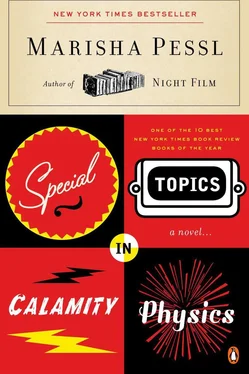He switched on the radio. His shirtsleeves were rolled up to his elbows, so when he shifted gears, the cute burnt toes of the tattoo angel became visible like the edge of a seashell peeking out of sand.
“What was strange,” he continued in his buffalo voice, “was that she said you. ‘When you get back.’ Not when we get back. Well, I’ve been thinking about the you. It can only mean one thing. She never planned to return with us.”
“I thought you didn’t think she committed suicide.”
He seemed to tobacco-chew this for a minute, squinting in the sun, shoving down the sun visor. We were speeding along the highway now, barreling through the thickened sunshine and the limp-rag shadows of the trees standing stiffly on the shoulder of the road. They held their branches high in the air — as if they knew the answer to an important question, as if they hoped to be called on. The Nissan was old and as Milton shifted the gears it rattled like one of those famished motel beds one feeds quarters to, a bed I’d never seen firsthand, though Dad claimed he’d counted seven within a one-mile radius in Northern Chad. (“They don’t have running water or bathrooms, but never fear, they have beds that buzz.”)
“She was sayin’ good-bye to us during those talks,” he said, clearing his throat. “She told Leulah, ‘Never be scared to cut your hair.’ And Jade. She said, ‘A lady should be a lady even when she removes her little black dress’—whatever the hell that means. She told Nigel to be himself, then somethin’ about wallpaper. ‘Change the wallpaper as much as you like and screw how much it costs. You’re the one who has to live there.’ And she said to me, before the thing about you, she said, ‘You just might be an astronaut. You just might walk on the moon.’ And Charles — no one knows what she said to him. He refuses to say. But Jade thinks she confessed she loved him. What’d she say to you?”
I didn’t answer, because obviously Hannah hadn’t said anything to me, not a single sentence of encouragement, however inscrutable and bizarre it sounded (no offense to Milton, but frankly, he didn’t strike me as the astronaut type; it was dangerous for a kid that size to float through the shuttle at zero gravity).
“See, I don’t want to believe suicide,” he went on thoughtfully, “because it makes me feel stupid. In hindsight, though, it adds up. She was always alone. That hair cut. Then, there’s what happened to the Smoke guy. And her thing for truckers who eat at Stuckey’s. Shit. It was all just sittin’ there. Obvious. And we didn’t see it. How’s it possible?”
He looked to me for help, but obviously I didn’t have a decent answer. I watched his eyes ski down the front of my dress, stopping somewhere around my bare knees.
“Any idea why she’d want me to take you to her house? Alone? ”
I shrugged, but the way he asked made me wonder if Hannah, after my flat-falling attempt to fix her up with Dad (mind you, that’d been B.C., or, before I knew about Cottonwood; A.C., or after Cottonwood, I’d sort of decided, for health reasons, she really wasn’t Dad’s dish), wanted to return the favor and had decided to tuck this sexy question mark of a sentence into Milton’s breast pocket, thereby ensuring at some point, in the Big-Bang aftermath of the camping trip (it was a simple scientific principle: after explosions, new beginnings) we’d conveniently find ourselves together, alone, in her empty house. Maybe she’d caught wind of my fixation from Jade or Lu or had figured it out on her own, given my graceless behavior at dinner. (I wouldn’t be surprised if all Fall and Winter Semester I’d had bird-nervous eyes: at Milton’s slightest movement, instantly airborne.)
“Hopefully, she left you a suitcase full of cash,” Milton said, smiling lazily. “And maybe if I’m nice, you’ll split it with me.”
As we approached Hannah’s house, slipping past the pastures, the quiet barns, the horses waiting like men in bus stations (the sun had cemented their hooves to the grass), the corkscrew tree, that little patch of hill where Jade always floored the Mercedes so the car flew over the top and our stomachs flipped like pancakes, I told Milton my account of what had happened on the mountain. (As with Jade, I omitted the section where I found Hannah dead.)
When he asked me what I thought Hannah was going to tell me, why she’d led me away from the campground, I lied and said I didn’t have a clue.
Well, it wasn’t exactly a lie. I didn’t know. But it wasn’t as if I hadn’t outlined, in the middle of the night, in meticulous detail, in the library silence of my room, on my Citizen-Kane desk (switching out my light if I heard Dad skulking around the stairs to make sure I was asleep), the Infinite Possibilities.
After laying some groundwork, I’d concluded there were two generalized schools of thought arising from this mystery. (This wasn’t including the possibility Milton had just disclosed, that Hannah might have wanted to hand me a few lukewarm good-byes — that one day I’d be strolling Mars, or that I shouldn’t hesitate to repaint my house in a flamboyant color since I was the one who lived there — stale, crumbly, oyster-cracker phrases she could have easily said to me as we hiked the trail. No, I’d have to assume what Hannah wanted to tell me was entirely different, more vital than anything she’d whispered to the Bluebloods.)
The first school of thought, then, was that Hannah had wished to confess something to me. It was an attractive idea, considering her hoarse voice, moth-moving eyes, the fitful starts and stops of her sentences as if she were operated by sporadic electricity. And what she had wanted to confess could have been any number of things, ranging from the crass to the crazy — her Cottonwood habit, for example, or an accidental affair with Charles, or that somehow she’d managed to kill Smoke Harvey; or perhaps she’d cultivated (another one of Jade’s shot put accusations, flung out with all her might, then forgotten as she strolled back to the locker room for stretches) a secret association with the Manson Family. (Incidentally, I still had Hannah’s copy of Blackbird Singing in the Dead of Night stored in a bottom desk drawer. My heart had stopped when I’d overheard Dee mention in second period Study Hall that Hannah had asked her Intro to Film class if anyone had removed a book from her desk. “Some bird book,” Dee said with a shrug.)
If this thesis was true — that Hannah had hoped to disclose a secret — I could only surmise she had chosen me to confess to, over, say, Jade or Leulah, because I looked unthreatening. Maybe she sensed, too, I’d read all of Scobel Bedlows Jr., his essays on judgments; basically, you weren’t allowed to have any so long as “devastation was directed inwards, at yourself, never other people or animals” (see When to Stone , Bedlows, 1968). Hannah also seemed to have had an innate understanding of Dad and perhaps she figured I was already a highly forgiving person, that I did my best to treat shortcomings like hobos I’d found dozing on my porch: take them in and maybe they’ll work for you.
The second school of thought, and obviously the more disturbing one, was that Hannah had wanted to disclose a secret All About Me.
I was the only one, out of all of them, who hadn’t washed ashore and been collected by Hannah after some tempest of a home life. I’d never run off with an old Turk, tried to throw my arms around the torso of a trucker (and strained to touch my hands together on the other side), suffered a street-life blackout, had a parent who was a junkie or in maximum-security prison. I wondered if Hannah knew a secret that revealed me to be like them.
Читать дальше












